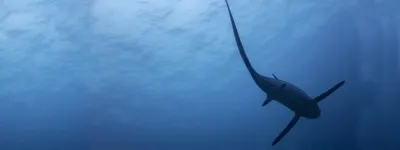According to an article in The Guardian, scientists believe that newborn megalodon sharks were likely taller than most adult humans.
A team of researchers made the discovery - published in Historical Biology - by X-raying the vertebra of a megalodon fossil, which suggested it must have been roughly two metres long when born! Megalodons, or enormous megatooth sharks, roamed the oceans more than three millions years ago and could grow to 15 metres in length - one of the largest carnivores to have ever lived. But until now, their birth size was a bit of a mystery.
While scientists have uncovered plenty of fossils in the past, as cartilaginous fish, often only the teeth remain. But, some rare samples do exist, including a megalodon vertebra held in a collection at the Royal Belgian Institute of Natural Sciences in Brussels. Based on comparisons with similar vertebrae seen in great white sharks, the fossil is thought to originate from a nine metre megalodon.

Alongside colleagues at Stockton and William Paterson universities in New Jersey, Shimada took CT scans of the 15cm vertebra, revealing 46 individual growth bands. The scans suggested that the megalodon grew steadily at a rate of around 16cm a year. Working backwards from the age of 46, the data suggests that the megalodon in question measured around two metres at birth, from nose to tail.
The impressive size of their offspring suggests that baby megalodons fed on the unhatched eggs of their siblings in the womb. This process - known as oophagy - is also found in other shark species such as great whites, threshers and makos. While less offspring survive as a result, the few that do are larger, better nourished, and stand a higher chance in the open ocean.
This project follows research conducted by Bristol and Swansea universities last year, which reconstructed the megalodon’s anatomy in greater detail. Led by palaeontologist, Michael Benton, from Bristol University, the team mathematically modelled the prehistoric species based on living relatives. The team discovered that a 16 metre megalodon was likely to have a head more than four metres long and a dorsal fin the height of an average human.




